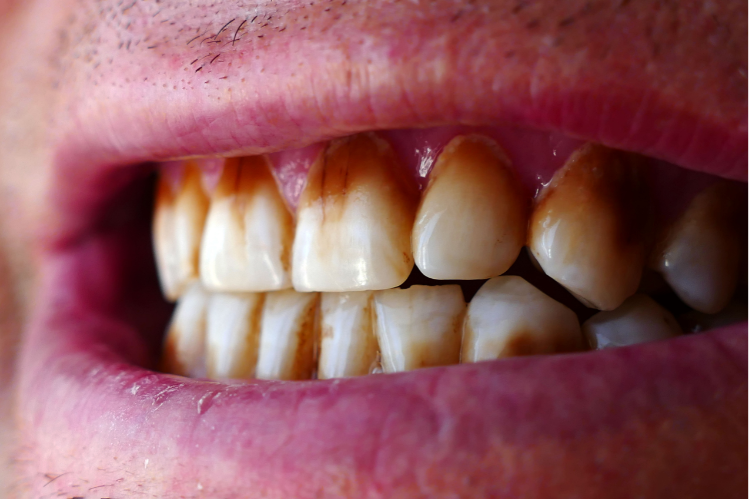
So, you just got your professional teeth whitening treatment done, and now your smile looks super bright and shiny, and of course, you want it to stay that way for as long as possible, but here’s the thing: some foods and drinks can make your teeth lose that brightness way faster than you think. In this blog, we’re going to talk about foods that stain teeth after whitening, what not to eat after teeth whitening, what you can eat instead, and some simple post-whitening diet tips for brighter teeth so your smile can stay white for a long time without needing another treatment too soon.
Why Staining Happens after Whitening
After a whitening treatment, your teeth are slightly more porous for about 24–48 hours. This makes them more vulnerable to staining agents found in certain foods and drinks. Think of your teeth like a white shirt fresh out of the wash; spill something dark on it, and it’ll show.
That’s why teeth whitening aftercare foods matter so much. The goal is to avoid heavy pigments until your enamel settles and can better resist stains.

Top Stain-Causing Foods and Beverages to Avoid
Coffee and Tea
Your morning coffee or afternoon tea might be the highlight of your day, but both are full of dark pigments and tannins that cling to tooth enamel like super glue. Especially right after whitening, when your teeth are more porous and vulnerable, stains happen fast and can be super noticeable.
Tip: If you just can’t skip it, drink through a straw (yes, even hot drinks if you can manage) and rinse your mouth right after to limit the damage.
Red Wine
Red wine might feel fancy and relaxing, but it’s basically a stain bomb for your teeth because of its deep pigments and acidity that can sneak into those tiny pores in your enamel.
Tip: If you’re celebrating, switch to white wine during the first 48 hours, it’s much less likely to ruin your whitening results.
Berries (Blueberries, Blackberries, Cherries)
Berries are super healthy and loaded with antioxidants, but they’re also loaded with intense natural colors that can cling to your teeth, and even berry juice can be just as bad.
Tip: Pick lighter fruits like bananas, pears, or apples for the first few days; they’re gentle on your teeth and won’t leave purple or red stains.
Tomato-Based Sauces
Tomatoes have two problems: they’re acidic and pigmented, which means they can both stain and weaken your enamel temporarily right after whitening.
Tip: Go for creamy or white sauces until your teeth have had time to recover.
Dark-Colored Sodas
Dark sodas are like a triple attack acid to soften enamel, sugar to feed bacteria, and artificial colors to leave long-lasting stains.
Tip: Swap them out for sparkling water or other clear drinks during the first couple of days after whitening to keep your teeth bright.
What Not to Eat after Teeth Whitening
To avoid stains after professional whitening, here are some surprising items to avoid:
- Soy sauce and balsamic vinegar – Dark, sticky, and full of pigments.
- Beets – Extremely vibrant in color.
- Colored candy – Artificial dyes cling to enamel.
- Curry – Strong yellow pigments can cause quick staining.
These might be delicious, but for a stain-free smile, skip them for at least 48 hours.
How to Maintain White Teeth after Whitening
- Rinse or brush after eating dark foods – Okay, so imagine you just ate spaghetti with a ton of tomato sauce or had a big slice of blueberry pie, all that dark color can actually start sticking to your teeth if you don’t do something about it pretty quickly, so rinsing with water or brushing right after helps get rid of the stuff before it has a chance to stain.
- Drink stain-prone beverages with a straw – If you love coffee, tea, or soda (and honestly, who doesn’t), a straw is like your secret weapon because it lets the drink bypass most of your front teeth, so the color and sugar touch them less, which means fewer stains over time.
- Stick to a “white diet” for the first 2 days – This means eating foods that are light in color, like chicken, plain pasta, white rice, bananas, and white fish, because for the first couple of days after whitening your teeth are kind of extra vulnerable to stains, so pale foods are the safest bet.
- Schedule touch-up whitening treatments every 6–12 months – Even if you’re super careful, stains can sneak back over time, so getting a quick whitening refresh about once or twice a year keeps your smile looking bright without starting all over again from scratch.
Post-Whitening Diet Tips for Brighter Teeth
Here’s what your plate should look like right after whitening:
- Proteins: Chicken, turkey, fish.
- Veggies: Cauliflower, potatoes, mushrooms.
- Fruits: Bananas, apples, pears.
- Drinks: Water, milk, coconut water.
These choices keep your smile bright without sacrificing flavor.
How to Avoid Food Stains
To sum it all up, if you just got your teeth whitened, the first 48 hours are crucial. To preserve your results, make sure to avoid dark colored foods that might stain your teeth. Also, avoid acidic or sugary foods as your teeth are more sensitive during this time. White teeth are a result of good habits and regular touch-ups. Keep a good oral routine that you can stick to; this will take you a long way. To make your teeth whitening touch-ups easy, you can you a portable teeth whitening pen .
FAQs
1. What foods to avoid after teeth whitening and for how long?
Avoid dark or acidic foods and drinks for at least 48 hours after whitening.
2. What are the worst foods for staining teeth?
Coffee, tea, red wine, berries, and tomato-based sauces are some of the worst offenders.
3. How to keep teeth stain free after whitening?
Limit dark foods, rinse after eating, and follow a consistent oral care routine.
4. Do eggs stain teeth after whitening?
No, plain eggs are safe; they’re light in color and won’t stain enamel.
Citations:
Higuera, V. (2020d, March 23). Best ways to keep teeth white while wearing braces. Healthline. https://www.healthline.com/health/whitening-with-braces
Karadas, Muhammet, and Nilgun Seven. “The Effect of Different Drinks on Tooth Color after Home Bleaching.” European Journal of Dentistry, vol. 08, no. 02, Apr. 2014, pp. 249–253, https://doi.org/10.4103/1305-7456.130622. Accessed 10 Mar. 2020.







